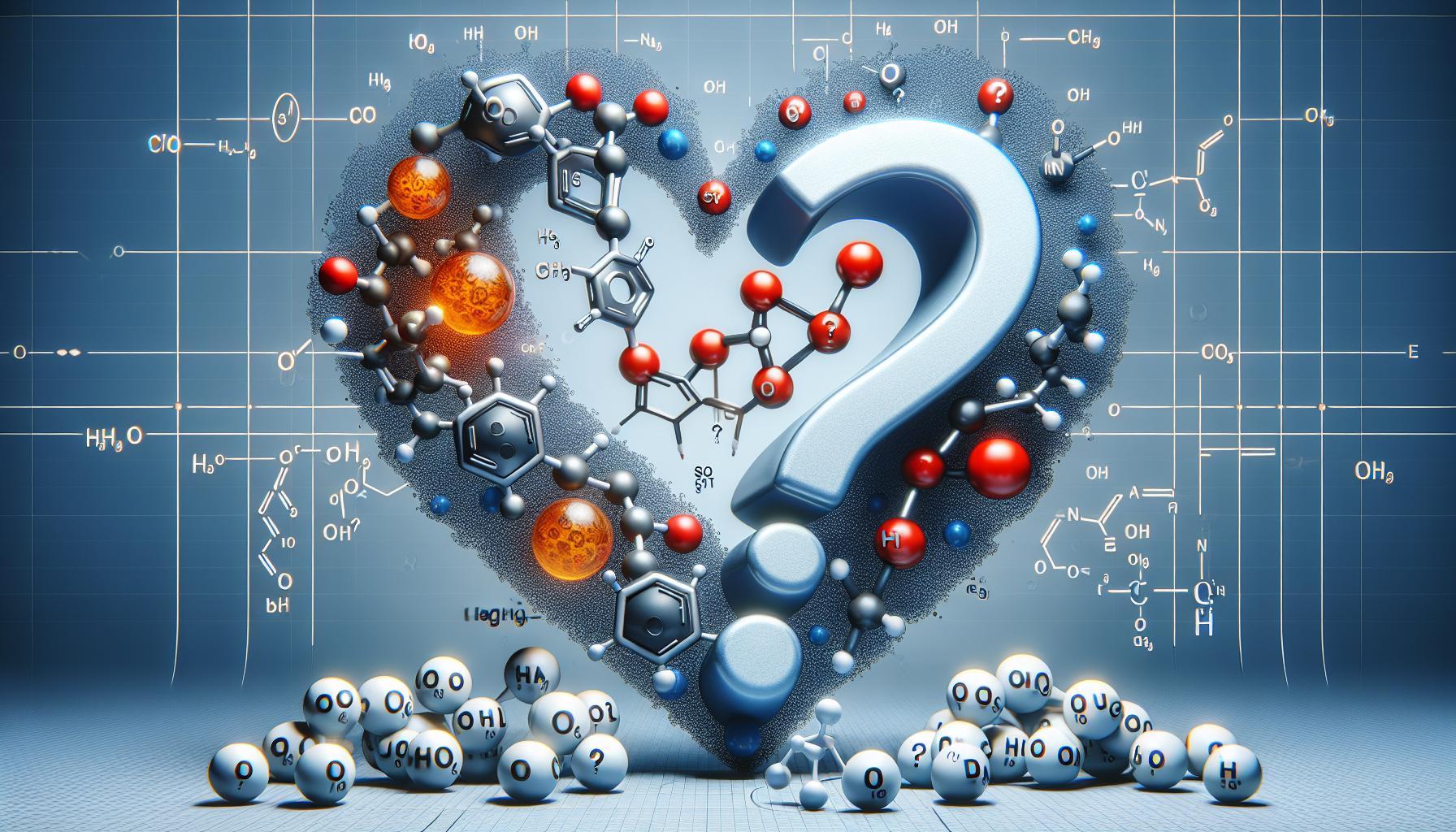Ever wondered about the hype surrounding CoQ10? If so, this blog post is perfect for you. Here, we delve deep into understanding the enormous buzz around CoQ10 by decoding the latest scientific findings. Your body’s powerful little “powerhouses”, also known as mitochondria, need CoQ10 for smooth functioning. While a popular supplement, is it truly beneficial for everyone or just a select few? Are there noticeable effects of its consumption that can enhance our health? This blog post will scrutinize the intricate details of CoQ10, its connection to our vital organs, the impact on those who take it, and debunk some common misconceptions. Join us as we embark on this scientific voyage to discern fact from fiction!
Table of Contents
- Unveiling CoQ10: Key Insights into this Powerhouse Compound
- Efficiency of CoQ10 Supplements: Evidence vs Hype
- Decoding the CoQ10-Statin Relationship: Do You Need Supplements?
- Potential Mitigating Factors for CoQ10 Efficacy: Mutation and Mitochondria Dysfunction
- Q&A
- Final Thoughts
Unveiling CoQ10: Key Insights into this Powerhouse Compound
From being essential to our mitochondria’s functioning to their known antioxidant properties, CoQ10 supplements have garnered considerable interest over recent decades. Besides the heart, liver and kidneys, this compound is found in high concentrations in pretty much all our cells where it aids in various vital biochemical functions. However, what is pivotal to note is that every cell can indeed produce its own CoQ10. Yet, there remain some people who, due to specific mutations, struggle with this creating a demand for external supplements.
The potential benefits of CoQ10 supplementation were explored through a randomized, double-blind, placebo-controlled trial using high-dose CoQ10 treatment. The results, however, were slightly disheartening, eliciting only minor improvements on aerobic capacity with no other clinically significant benefits realised. Then, coming to issues from mitochondrial dysfunction, a dedicated review (encompassing all the relevant clinical studies) noted that a staggering 73% of patients saw no response to CoQ10 treatment. Even those who did respond exhibited only partial effects and the quintessential question of whether this was due to CoQ10 or merely a placebo effect remained unanswered.
- Ubiquinone: This is the oxidized form of CoQ10 and is commonly found in commercial supplements.
- Ubiquinol: Ubiquinone must be reduced to ubiquinol in our body. It’s important to stress that the research we delve into here includes both types.
Then, there are statins. These medications, utilized to pull down LDL cholesterol, can unfortunately also reduce the levels of CoQ10. Hence, many argue that individuals on statin medications should consider CoQ10 supplements, assuming a potential reduction in the risk of developing muscle pains from statins.
| Health Aspect | Is CoQ10 Recommended? |
|---|---|
| Heart Health | Under Investigation |
| Mitochondrial Issues | Partial Benefits Observed |
| Cholesterol Management | No Clear Indications |
| Aerobic Capacity | Minor Effects Noted |
Efficiency of CoQ10 Supplements: Evidence vs Hype

CoQ10 supplements have gained widespread popularity attributed to its essential role in our mitochondria’s function. The mitochondria, referred to as the powerhouses of our cells, need CoQ10 for proper functionality. Further to this, CoQ10 exhibits potent antioxidant properties and is accumulated in high concentrations in the heart, liver, and kidney. The twist in this tale though is that all our cells can produce their own CoQ10, circling us back to the question – are the supplements really beneficial for everyone or just a result of clever marketing?
In light of this, focusing particularly on those who struggle to manufacture their own CoQ10 due to genetic mutations negatively impacting their mitochondrial function, a randomized, double-blind, placebo-controlled trial was conducted using high-dose CoQ10 treatment. The outcomes were rather anticlimactic with only minor effects recorded on aerobic capacity and no other clinically relevant improvements in strength or resting lactate. Furthermore, a systematic review amalgamated all relevant clinical studies found that a staggering 73 percent of the sampled people experienced no response to CoQ10 treatment. Even those who did respond, the effect was partial, leading to speculation about whether the influence was truly biological or a placebo effect.
The two main forms of CoQ10 are ubiquinone – the oxidized form of CoQ10 commonly found in commercial supplements, and ubiquinol – the reduced form it must convert to in the body. Statin medications that can reduce levels of CoQ10 are often paired with CoQ10 supplements in the belief that it may prevent the development of muscle pains as a side effect of statins. However, a statement from the American Heart Association bluntly contradicts this conjecture, stating clear non-endorsement of such a practice based on the evidence from randomized controlled trials. Despite this, CoQ10 continues to be tried as an experimental treatment for patients experiencing issues with their mitochondria, as currently, there are no established treatments for such conditions.
Decoding the CoQ10-Statin Relationship: Do You Need Supplements?

Understanding CoQ10 and Statins
CoQ10, short for Coenzyme Q10, is a powerful antioxidant naturally produced in our bodies and concentrated in major organs such as the heart, kidney, and liver. Moreover, it’s among the essential components that fuel our cells’ powerhouses, the mitochondria. Statins, on the other hand, are common medications used to lower LDL cholesterol levels. Despite their crucial role, these drugs unfortunately, can deplete the body’s CoQ10 levels. This connection has led to a familiar notion online that anyone on Statin medications should also take CoQ10 supplements to beat the risk of developing statin-induced muscle pains.
Not All Benefit from CoQ10 Supplements
The benefits of taking CoQ10 supplements, however, are not universal. For instance, those who struggle to naturally produce CoQ10 due to genetic mutations may experience underperforming mitochondria. Despite this, a randomized double-blind placebo-controlled trial revealed only slight effects on aerobic capacity with high-dose CoQ10 treatment and no other significant improvements in strength or resting lactate levels. Even in a systematic review that combined all relevant studies examining patients with mitochondrial issues, a massive 73% saw no response to CoQ10 treatment. This persistent lack of clear benefits is a concern for medical practitioners. They are left with few good treatment options for patients with mitochondrial issues, and CoQ10 supplements are viewed as a ‘might as well try’ solution rather than a scientifically backed treatment plan.
Why People Use CoQ10 Supplements?
- To enhance their antioxidant intake
- To compensate for reduced CoQ10 levels due to statins
- Boost the functioning of mitochondria
- Improve aerobic capacity
- Relief muscle fatigue due to statins
Different Forms of CoQ10
| Ubiquinone | The oxidized form of CoQ10 found in commercial supplements that needs to be reduced in the body to ubiquinol. |
| Ubiquinol | The form of CoQ10 that’s active and functional inside the body. |
The research supporting these claims includes both ubiquinone and ubiquinol forms of CoQ10. While ubiquinone is commonly found in commercial supplements, it needs conversion into ubiquinol within the body for better bioactivity.
Potential Mitigating Factors for CoQ10 Efficacy: Mutation and Mitochondria Dysfunction
Mutations and mitochondrial dysfunctions play crucial roles in mitigating the efficacy of CoQ10 supplements. There are minimal benefits that can be gained from using CoQ10. Among individuals with mitochondrial issues, studies showed that 73 percent saw no effect in response to treatment with CoQ10. The remaining minority who did show some response were only partially affected, and it remains unestablished whether this was, in fact, a true effect from the CoQ10 or merely a placebo effect.
Commercial CoQ10 supplements frequently contain ubiquinone, the oxidized form of CoQ10. However, it needs to be reduced in the body to ubiquinol, a process which not all individuals may easily manage. Despite suggestions that CoQ10 supplements might reduce the chance of developing muscle pains from statins (medications used to lower LDL cholesterol), the American Heart Association doesn’t endorse this theory. They argue that randomized controlled trial evidence does not sufficiently support it. Therefore, while CoQ10 is deemed essential for mitochondrial function and known for its antioxidant properties, it doesn’t seem to offer clear benefits for those with mitochondrial defects or mutations that inhibit natural CoQ10 production.
Q&A
Q: What are the benefits of taking CoQ10 supplements?
A: CoQ10 is essential for our mitochondria’s function and has antioxidant properties. However, evidence shows that benefits may vary for different individuals.
Q: Who may benefit the most from taking CoQ10 supplements?
A: Individuals who struggle to produce their own CoQ10 due to mutations that affect mitochondria function may benefit the most from CoQ10 supplementation.
Q: What does the research say about the effectiveness of CoQ10 supplements in improving aerobic capacity and strength?
A: A randomized double-blind placebo-controlled trial showed only minor effects on aerobic capacity and no clinically relevant improvements in strength for individuals taking high-dose CoQ10 treatment.
Q: Are there clear benefits of CoQ10 supplementation for patients with mitochondrial issues?
A: According to a systematic review of clinical studies, 73 percent of patients with mitochondrial issues showed no response to CoQ10 treatment. For those who did respond, the effects were only partial and difficult to distinguish from a placebo effect.
Q: Can CoQ10 supplements help reduce muscle pains caused by statin medications?
A: While it is commonly believed that CoQ10 supplements may reduce muscle pains associated with statin medications, the American Heart Association states that randomized controlled trial evidence does not support this idea.
Final Thoughts
As we wrap up our foray into the enigmatic world of CoQ10 supplements, it’s crucial to assert that our understanding of this popular supplement and its implications on health continues to evolve. Our exploration revealed that while CoQ10 is pivotal for cellular function, the potential benefits from supplemental use are not as clear-cut. It seems pertinently essential in cases where individuals struggle to naturally produce their own CoQ10 due to genetic mutations. The data from clinical studies, however, proved inconclusive, revealing limited effects on aerobic capacity and negligible overall impact on mitochondrial issues.
We also dipped into the common belief that statin users should supplement with CoQ10, but the American Heart Association’s stance remained contrary to this notion. So, were we able to entirely decode the CoQ10 buzz? Possibly not. But we’ve certainly managed to paint a more nuanced picture, based on scientific evidence, adding a layer of measured discernment to your daily supplement considerations. As always, remain keen, curious, and informed as we continue to unveil the shadows of the health and wellness cosmos in our subsequent posts. Until our next scientific sojourn, stay healthy!



